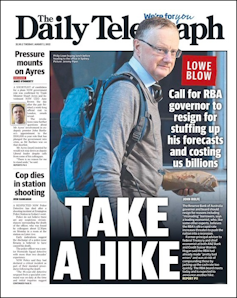an easy scapegoat for record interest rate rises
- Written by Peter Martin, Visiting Fellow, Crawford School of Public Policy, Australian National University

Reserve Bank Governor Philip Lowe is getting terrible press, most of it undeserved.
“Lowe Blow” and “Take a Hike[1]” were two of the headlines on the front page of one of our newspapers. “We’ve had our Phil[2]” was on the front page of another.
His critics – the ones complaining about continual increases in interest rates – seemed happy enough when he was keeping them low.
















